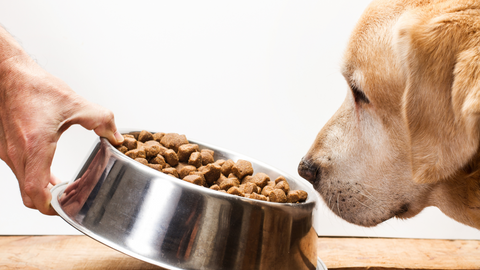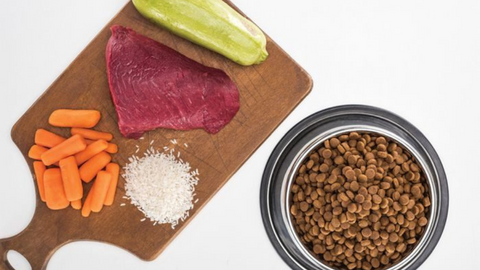Do Pets Need Kibble?

The plant-based movement for human health is becoming increasingly mainstream and for good reason.

Most of us are not only making food choices for ourselves, but we are also making them for our companion animals. According to The American Pet Products Association, 70% of U.S. households have at least one pet. [1] Like human health, the impact of our food choices impacts the health of millions of beloved pets that are part of our families.
But can our pets—especially our dogs and cats—thrive on a plant-based diet?
Or are processed kibbles, moist dog food, or meat products essential?

While there is an overwhelming consensus that our cats are obligate carnivores, there is some room for exploring a plant-based diet for our companion dogs.
According to a journal article from The American Veterinary Medical Association, essential macronutrients for dogs can be found in both plant and animal ingredients.
However, micronutrients pose a greater challenge when formulating a complete and balanced food for dogs. No single ingredient, regardless of whether it's of plant or animal origin, contains all the essential nutrients in sufficient quantities or proportions.

While all the essential nutrients can be obtained from non-animal sources, plant-based ingredients may have insufficient quantities of some of these nutrients. [2]
Here are five things to keep in mind when switching your dog to a plant-based diet:
1. Carefully select plant-based proteins.
Beans and legumes such as lentil, chickpeas, and edamame are rich plant-based protein sources for your dogs. Kale, broccoli, and mushrooms can complete your dog’s amino acid intake as well.
2. Avoid unhealthy carbohydrate fillers.
While there is certainly no harm in having carbohydrates in your dog’s diet, eliminate sources that have low-protein content, such as wheat, rice, and corn. Rather, provide fillers in the form of protein-rich, nutritious sources such as quinoa, oats, and kamut.
3. Supplement your dog’s diet.
Just as plant-based humans may need to take supplements, plant-based puppies may need that as well. Many vegan dog food offerings include appropriate supplementation.
4. Gradually transition your dog to a plant-based diet.
Just as with humans, a sudden and dramatic shift to a dietary pattern may cause short-term symptoms and discomfort to your dog.
5. Consult with your veterinarian.
A trusted doggy doctor can educate you on the nutritional needs of your canine companion and administer essential tests to ensure that your dog is getting the proper nutrition for optimal health. If your vet is not knowledgeable or supportive of your plant-based inquiries, there are many dedicated vegan veterinarians who may be able to prepare you for this journey.

Sources:
[1] https://www.americanpetproducts.org/press_industrytrends.asp
